Mary Anne Yarde's Blog: The Coffee Pot Book Club , page 215
November 14, 2016
#bookreview ~ Amie stolen Future #thriller @LucindaEClarke
I usually only review historical or mythological /paranormal books on this blog, but I have made the exception for this thriller because, not only is Lucinda E Clarke one of my favourite thriller authors, this book — this series — is one of those rare gems you stubble upon every now and then. I would happily shout that from the rooftops!
Amie Stolen Future
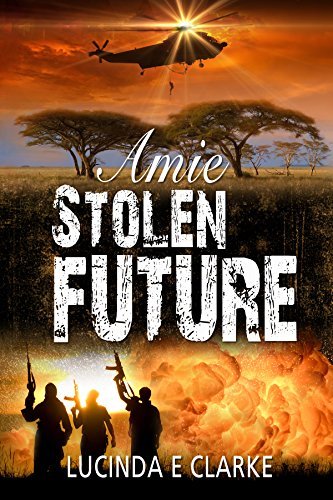 Amie returns to her beloved Africa and a settled life, but her enemies have neither forgiven nor forgotten her. They are determined to take their revenge and reclaim their honour. The events of one night change everything, leaving her with no home, no friends and no name; no future. Suddenly she no longer exists and those controlling her make it clear; she either obeys or she dies.
Amie returns to her beloved Africa and a settled life, but her enemies have neither forgiven nor forgotten her. They are determined to take their revenge and reclaim their honour. The events of one night change everything, leaving her with no home, no friends and no name; no future. Suddenly she no longer exists and those controlling her make it clear; she either obeys or she dies.Stolen Future is the third book in the 'Amie' series - international multi award winning #1 bestsellers on both sides of the Atlantic. From naive, newly-married housewife, Amie faces challenges that change her beliefs and behaviour beyond all recognition.
A fast-paced action adventure, page turning read set in the wilds of Africa in the modern day.
What did I make of the book? I was so excited to get my hands on Lucinda E Clarke's latest book. I am completely enchanted by Clarke's "Amie" series, and book 3 did not disappoint. But readers, be warned, once you start reading this book, you are not going to be able to put it down!This book breathes Africa. I could even feel the heat of the sun, and smell the animals in the air. Amie Stolen Future is an exemplary example of suspense / thriller fiction. There was never a moment in this book where my attention wavered. It was just...ah, I can't find the words!!As with the other books in this series, I loved Amie — she is such a strong ordinary woman who finds herself in the most extraordinary dangerous situations. She suffers heartache after heartache, but she will not be beaten. She is determined to live, despite the fact that there many people intent on killing her and those she loves.Clarke has introduced some more characters to this page-riveting series, and I must admit I did fall a little for Simon ~ without giving the plot away, I think Amie made the right choice!This book is definitely in the top 10 books I have read this year. Fantastic! I Highly Recommend.
Links for Purchase Amazon US Amazon UK
About the authorLucinda E Clarke [not her real name] was born in Dublin, but has lived in 8 other countries to date. She wanted to write but was railroaded into teaching. She had a habit of "falling" into other careers, announcing on radio, then scriptwriting for radio and television. She has been a professional writer since 1986 winning over 20 awards for her work, including mayoral speeches, company profiles, drama documentaries, educational programmes for radio and television, adverts, news inserts, court videos, National Geographic, cookery programmes, to name but a few!
She lectured in scriptwriting, had her own column in various publications, and written for national magazines. She was commissioned for two educational books by Heinemann and Macmillan, and book reports for UNESCO and UNICEF.
She graduated into running her own video production company in South Africa.
"Walking Over Eggshells" is her first self-published book, an autobiography which describes her adventurous life, trying to escape the emotional abuse she suffered from early childhood.
She published her second book a novel, "Amie an African Adventure" in July 2014, already a #1 bestseller in genre on Amazon.co.uk.
Lucinda's third book 'Truth, Lies and Propaganda', was published on Amazon on November 30th 2014. It is the first in a series of two books and 'More Truth, Lies and Propaganda' is due out in 2015. They follow the author's journey from the classroom to radio announcing, on to television and finally to setting up her own video production company. The books are packed with anecdotes of the often hilarious things that happened while out shooting a wide variety of subjects, taking the reader behind the scenes in the media and highlighting South Africa and its people.
The second book in the Amie series Amie and the Child of Africa was released in October 2015.
Published on November 14, 2016 00:00
November 12, 2016
#bookreview ~ Divided Empire #Histfic @Oldbrookender
Divided EmpireByBrian Kitchens

Britain, 391 AD.
The geographical, political and social outlines of the annexed nation are being constantly redefined, as the battling powers in Rome attempt to seize control of the Empire.
Flavius Vitulasius and his trusted associate, Siward, are journeying to receive a highly confidential mission, across the narrow sea, from the Master of Offices in Gaul.
On their path, they stumble upon a seeming damsel in distress, her carriage under attack from bandits. Using all their prowess and experience, Flavius and Siward rescue the damsel from certain death. Nevertheless, the beautiful young lady, Corellia Velva, is not as she seems.
When Corellia slips away the following night, Flavius thinks nothing of it. He has orders passed down from the Emperor himself to attend to. A document, the ‘Pagan Concord’, threatens to pull apart Britain at the seams, creating the lurking fear of civil war between the Christians and Pagans.
If Flavius and Siward can recover the ‘Pagan Concord’, they will be able to unmask the conspirators behind the unrest. With the help of an ardent Christian, Lucius Aurelius, the trio commence their enquiries in a clearly divided Britain.
However, their expedition takes an unexpected turn when they visit the town of their first suspect. Once again, they come across Corellia. She fervently denies any knowledge of Flavius and Siward, suggesting that it is a case of mistaken identity, prompting suspicion from Flavius.
The disquiet among Pagans soon becomes clear, as ritualistic sacrifices and mysterious disappearances soon become the norm, while Flavius attempts to track down the ‘Pagan Concord’ and save the country of his origin. It is not long before he has some unwelcome attention, as murderous villains stalk his every move.
Can Flavius locate the document in time?
Is there more to Corellia than meets the eye?
Can he escape the clutches of his murderous pursuers, and uncover a conspiracy that goes right to the top?
***
What did I think of the book?
The Golden Age of Imperial Rome is coming to an end, and Flavius Vitulasius has his orders — he is to return to Britain and find a document known only as the ‘Pagan Concord.’ If this document were to fall into the wrong hands, it would undoubtedly cause, not just unrest, but civil war between the Roman Christians and the native Pagans of this cold and damp little island.
What, on the face of it, appears to be a simple assignment, turns into a complicated nightmare, and Flavius must keep his wits if he is to escape with his life.
What a refreshing and compelling read. With likeable characters and an engaging plot, Divided Empire, is a wonderfully refreshing take on the last days of Roman Britain.
Kitchen's attention to detail is staggering. He has created a world that is not only fresh but as accurate as it possibly could be in the telling. It is obvious Kitchen has spent a great deal of time researching this fascinating period.
This book kept me guessing throughout. I was intrigued by the character of Corellia. She is a mysterious and intriguing woman, who has an interesting past and a somewhat precarious lifestyle! Flavius certainly met his match when he stumbled upon her!
Full of intrigue and suspense, Divided Empire is a sit-down and finish book. I look forward to reading more books by this author.
Links for PurchaseAmazon USAmazon UK
About the author
 Brian Kitchen lives in Burton upon Trent, England and enjoys walking in the countryside, photography, reading, writing, visiting museums and historic sites & buildings and supporting Burton Albion. He first became interested in the history of Roman Britain as a child and loved the Eagle of the Ninthtrilogy of novels by Rosemary Sutcliff. The first of the Flavius Vitulasius novels, Divided Empire is his first published novel.
Brian Kitchen lives in Burton upon Trent, England and enjoys walking in the countryside, photography, reading, writing, visiting museums and historic sites & buildings and supporting Burton Albion. He first became interested in the history of Roman Britain as a child and loved the Eagle of the Ninthtrilogy of novels by Rosemary Sutcliff. The first of the Flavius Vitulasius novels, Divided Empire is his first published novel.Should you wish to know more about Flavius & his friends, please visit his website & Facebook page:
facebook.com/FlaviusVitulasius
www.briankitchen.me.uk
Published on November 12, 2016 03:10
#bookreview ~ Divide Empire #Histfic @Oldbrookender
Divided EmpireByBrian Kitchens

Britain, 391 AD.
The geographical, political and social outlines of the annexed nation are being constantly redefined, as the battling powers in Rome attempt to seize control of the Empire.
Flavius Vitulasius and his trusted associate, Siward, are journeying to receive a highly confidential mission, across the narrow sea, from the Master of Offices in Gaul.
On their path, they stumble upon a seeming damsel in distress, her carriage under attack from bandits. Using all their prowess and experience, Flavius and Siward rescue the damsel from certain death. Nevertheless, the beautiful young lady, Corellia Velva, is not as she seems.
When Corellia slips away the following night, Flavius thinks nothing of it. He has orders passed down from the Emperor himself to attend to. A document, the ‘Pagan Concord’, threatens to pull apart Britain at the seams, creating the lurking fear of civil war between the Christians and Pagans.
If Flavius and Siward can recover the ‘Pagan Concord’, they will be able to unmask the conspirators behind the unrest. With the help of an ardent Christian, Lucius Aurelius, the trio commence their enquiries in a clearly divided Britain.
However, their expedition takes an unexpected turn when they visit the town of their first suspect. Once again, they come across Corellia. She fervently denies any knowledge of Flavius and Siward, suggesting that it is a case of mistaken identity, prompting suspicion from Flavius.
The disquiet among Pagans soon becomes clear, as ritualistic sacrifices and mysterious disappearances soon become the norm, while Flavius attempts to track down the ‘Pagan Concord’ and save the country of his origin. It is not long before he has some unwelcome attention, as murderous villains stalk his every move.
Can Flavius locate the document in time?
Is there more to Corellia than meets the eye?
Can he escape the clutches of his murderous pursuers, and uncover a conspiracy that goes right to the top?
***
What did I think of the book?
The Golden Age of Imperial Rome is coming to an end, and Flavius Vitulasius has his orders — he is to return to Britain and find a document known only as the ‘Pagan Concord.’ If this document were to fall into the wrong hands, it would undoubtedly cause, not just unrest, but civil war between the Roman Christians and the native Pagans of this cold and damp little island.
What, on the face of it, appears to be a simple assignment, turns into a complicated nightmare, and Flavius must keep his wits if he is to escape with his life.
What a refreshing and compelling read. With likeable characters and an engaging plot, Divided Empire, is a wonderfully refreshing take on the last days of Roman Britain.
Kitchen's attention to detail is staggering. He has created a world that is not only fresh but as accurate as it possibly could be in the telling. It is obvious Kitchen has spent a great deal of time researching this fascinating period.
This book kept me guessing throughout. I was intrigued by the character of Corellia. She is a mysterious and intriguing woman, who has an interesting past and a somewhat precarious lifestyle! Flavius certainly met his match when he stumbled upon her!
Full of intrigue and suspense, Divided Empire is a sit-down and finish book. I look forward to reading more books by this author.
Links for PurchaseAmazon USAmazon UK
About the author
 Brian Kitchen lives in Burton upon Trent, England and enjoys walking in the countryside, photography, reading, writing, visiting museums and historic sites & buildings and supporting Burton Albion. He first became interested in the history of Roman Britain as a child and loved the Eagle of the Ninthtrilogy of novels by Rosemary Sutcliff. The first of the Flavius Vitulasius novels, Divided Empire is his first published novel.
Brian Kitchen lives in Burton upon Trent, England and enjoys walking in the countryside, photography, reading, writing, visiting museums and historic sites & buildings and supporting Burton Albion. He first became interested in the history of Roman Britain as a child and loved the Eagle of the Ninthtrilogy of novels by Rosemary Sutcliff. The first of the Flavius Vitulasius novels, Divided Empire is his first published novel.Should you wish to know more about Flavius & his friends, please visit his website & Facebook page:
facebook.com/FlaviusVitulasius
www.briankitchen.me.uk
Published on November 12, 2016 03:10
November 10, 2016
Blog Tour ~ The Thief of Hearts @EECarterAuthor @SecretRealmBook
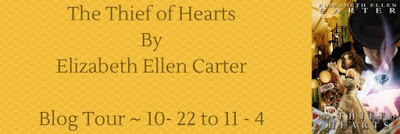
The Thief of HeartsByElizabeth Ellen Carter
Blog Tour


December 1890London, England
Some seriously clever sleight of hand is needed if aspiring lawyer Caro Addison is ever going to enjoy this Christmas.
To avoid an unwanted marriage proposal, she needs a distraction as neat as the tricks used by The Phantom, the audacious diamond thief who has left Scotland Yard clueless.
While her detective inspector uncle methodically hunts the villain, Caro decides to investigate a suspect of her own – the handsome Tobias Black, a magician extraordinaire, known as The Dark Duke.
He's the only one with the means, motive and opportunity but the art of illusion means not everything is as it seems, in both crime and affairs of the heart.As Christmas Day draws near, Caro must decide whether it is worth risking reputations and friendships in order to follow her desires.

He turned the card over and with a thumbnail flicked a tab made of the same backing as the playing card. Even up close the addition was difficult to see. Tobias placed the card on his lap and pulled out a deck of cards. He flicked the edge of the deck of cards towards them. Each time the Queen of Hearts stood out.“I want you to think I can read your mind, but in reality...”Tobias split the deck and showed them the Queen of Hearts and then the other half of the deck. The card that had been just before the Queen of Hearts was fully a third shorter than the rest of the cards. He put the pack together and flicked through the deck once more.“I make you see what you want to see. I suspect The Phantom does the same.”“You mean his crime scenes are illusions?” Margaret asked. Tobias gave her a smile and Caro wished oddly that its brightness shone on her too.“I think so. From what I read in the newspapers... no sign of entry or departure?” he asked. Caro confirmed it with a nod. “That tells me he’s creating an illusion of invulnerability. But it is an illusion. A trick. He wants to force the attention of the police away from something else – in the same way a magician will use a gesture or an action to distract you.“Find out what that is then you will find his sleight of hand and that will be his vulnerability.”Tobias stood.“Now, if I’ve sated your curiosity, I’ll take my leave of you. My crew and I have our last show this evening.”Caro rose and Margaret did also. Tobias took Margaret’s hand and bowed over it then released it. Then he took Caro’s and held it. Then his eyes held hers for a moment and he dropped a kiss on the back of her hand.“I’m so glad it was you who paid me a visit... instead of a representative of Scotland Yard.”“Not at all, Mr Black,” she replied, her voice a little huskier than usual, “you have been more than gracious with your time.“Call me Tobias.”He was flirting with her! Caro kept the smile to herself as he escorted them both to the entrance of the theatre.“Just one more question, Mr Black,” Caro asked. “You wouldn’t happen to know how someone might dispose of a suite of diamonds would you?”

Amazon.com - https://www.amazon.com/Thief-Hearts-Elizabeth-Ellen-Carter-ebook/dp/B01MAWBWI5Amazon.com.au - https://www.amazon.com.au/Thief-Hearts-Elizabeth-Ellen-Carter-ebook/dp/B01MAWBWI5Amazon.co.uk - https://www.amazon.co.uk/dp/B01MAWBWI

 Elizabeth Ellen Carter is an award-winning historical romance writer who pens richly detailed historical romantic adventures. A former newspaper journalist, Carter ran an award-winning PR agency for 12 years. The author lives in Australia with her husband and two cats.
Elizabeth Ellen Carter is an award-winning historical romance writer who pens richly detailed historical romantic adventures. A former newspaper journalist, Carter ran an award-winning PR agency for 12 years. The author lives in Australia with her husband and two cats. • Web: http://eecarter.com• Facebook: https://www.facebook.com/ElizabethEllenCarter• Twitter: https://twitter.com/EECarterAuthor• Pinterest: https://www.pinterest.com/eecarterauthor/
• Web: http://eecarter.com• Facebook: https://www.facebook.com/ElizabethEllenCarter• Twitter: https://twitter.com/EECarterAuthor• Pinterest: https://www.pinterest.com/eecarterauthor/
About The Thief of Hearts Australians suffer a little bit of cognitive dissonance when it comes to celebrating Christmas. First of all, being in the southern hemisphere, we celebrating in the middle of our summer but happily sing about ‘dashing through the snow’, Frosty the Snowman and that the ‘snow lay all about, deep and crisp and even’.Another thing we missed in our local customs was being outside of the TV ratings periods. Conventional wisdom had it that in the depths of bitter winters, people would gather around the electronic hearth and watch television. And since Christmas fell right in the middle of the northern hemisphere’s TV ratings period, all the best TV shows had a Christmas episode.They were fun and whimsical, often suspending current storylines for something a little bit light-hearted and fun.So, in that Christmas spirit, I wrote The Thief of Hearts, a veritable Christmas punch of few Hercule Poirots, Girl’s Own Adventures stories, a dash of While You Were Sleeping and other Christmas-themed rom-coms.
Why Did You Set It in Victorian England? Many of our Christmas customs started with the Victorians, including our beloved Christmas tree and the fun Christmas crackers.Victorian England was a fascinating era. They were very mindful of their past and had built up quite a romantic imagery of its chivalry – just look at the pre-Raphaelite works as examples of high Victorian romanticism and yet they were very technologically advanced and sophisticated.Many of the things we take for granted today, inexpensive mass-produced consumer goods, electricity, telephony, stored music, motorised transport, photography and film, even the concept of television had their origins in the 19th century – no wonder Steampunk has become such a popular sub-genre of sci-fi!There were high hopes for the upcoming 20th century as being the most accomplished century yet. The groundswell for true equality for men and women was beginning and within a relatively short space of time, women were fully enfranchised and were open to the same job opportunities.Late Victorian England was time of man-made wonders and magic falls into that neatly.
Why write a mystery? One of my favourite authors is Agatha Christie. I love the way she blended mystery and romance in many of her stories. If you look at Poirot and Miss Marple, there are often secondary characters who begin or advance a romance through the story and, with the solving of the mystery have their happily ever after.I thought it would be fun to do something like that for The Thief of Hearts, so the mystery is very much front-and-centre but there is a definite romance between Caro Addison, an aspiring lawyer and Tobias Black, a magician and former solider whose paths are destined to cross.There is more than one mystery in The Thief of Hearts. There is the obvious one in the mysterious diamond heists where the thief as apparently left no clue, but there is also one a little closer to home and that is what are Bertie’s real intentions towards Caro?She is positive that he is planning to propose. While her mother would be delighted by the news, Caro herself is having second thoughts. She loves Bertie, but she’s not ‘in love’ with him – so to avoid an unpleasant scene with someone she likes, Caro invents reasons not to be alone with him.The Thief of Hearts is full of misdirection.
What did you enjoy researching? I had a lot of fun with the research for The Thief of Hearts.Victorian England was full of innovation and invention – so discovering the polyphon which was a precursor to the record player, simply had to be included. So too the passenger lift, the glorious elevators found in the most luxurious hotels and as a necessity in the growing high rise buildings that is emblematic of New York.The rise of literacy in the Victorian England which came as a result of pressure from the church welfare reformers, gave birth to a large number of newspapers to cater for interests and tastes of a wider group of readers. In fact it could be argued that modern journalism as we know it today, started in the Victorian era.The Victorian period also gave rise to the mystery and detective story. The origin of this was also interesting. The 19th century saw the rise of the middle class who were at removed a lot of direct contact with crime – particularly street crime. In addition, criminal executions which were once public affairs, were now performed behind prison gates.What didn’t change was the public’s appetite for the gruesome details and, indeed some broadsheets specialized in it thus beginning the still popular genre of True Crime and the origins of the crime and detective novel where real crime wasn’t enough.
What are you working on at the moment? There’s so much! I’m working hard on another 19th century title called Captive of the Corsairs. Although it is set in the Regency era, it is not a typical Regency at all. It’s set in Sicily and Turkey and centres on the pirates of the Barbary Coast – North Africa who conducting slaving raids into Europe.It’s intended to be a stand-alone, but some of the characters are calling for their own stories, so I think this may turn into a three book series.I’m also keen to set started on another mystery romance series! This will be a six book series set in Medieval England. The hero and heroine are more mature, they will be in their mid-to-late 30s and there are some younger characters too who are terrific.Hopefully my Roman era historical romantic suspense will have found a publisher. Hosted By:Secret Realm Book Reviews & Services
Published on November 10, 2016 00:00
November 9, 2016
Author’s Inspiration ~ L.S.Young #Histfic #romance @LSYoungAuthor
Please give a warm welcome to Historical Romance author, L.S.Young, who is going to tell us about the inspiration behind her latest book…A Woman so Bold

Twenty-year-old Landra Andrews is as brazen and unique as her first name. Although educated and well-connected, she is trapped by a dark secret from her past. She fears the rest of her life will be decidedly prosaic, until a dashing young man inherits a neighboring farm and sweeps her off her feet.
William Cavendish is a second son from an old Southern family. A gentleman in conduct and an artist at heart, he has sown his wild oats in the years he spent abroad and is ready to settle down. He is taken with well-spoken, headstrong Landra from their first meeting, and his heart for her only grows.
William seems to be everything Landra has dreamed of but never dared to believe she could have—handsome, kind, and well-bred—but when they are wed, she soon finds herself in all-too-familiar surroundings, toiling once more against land that won’t yield. Her restless spirit and iron will rebel against her discontent, and when a lover from her youth returns, she finds herself torn between two very different men. Will the mistakes of her past destroy her hope for the future?
***
Author’s Inspiration
 The initial inspiration for my novel came to me on a windy day at age seventeen, while standing in my grandmother’s back yard, watching a storm come in. The wind was blowing white sand across this field of winter rye and I started thinking about what it would have been like to live in Florida as a woman in the 19th century. I went inside and wrote what would become the opening lines of A Woman So Bold. Like many historical writers, the past has always been more interesting to me than the present. Although I put this novel away for a long time, only resurrecting it about four years ago, it is an idea I have been preoccupied with for twelve years. I live on land farmed by my family on my mother’s side nearly one hundred years ago, and it was important to me for my first novel to be based on my roots. The setting is a fictional town called Willowbend which I placed within several miles of Madison, Florida, where I grew up. Hearing stories from my grandmother about her childhood and early womanhood on a farm in the twenties and thirties has been integral to my story as well. She told me about how her mother’s family came down to Florida from the Carolinas in a covered wagon in the late-19th century. The idea of women who were connected to the land, eking out a living in a humid, warm climate, bearing children before modern medicine, appealed to me. We don’t hear many voices from these women in literature, and I wanted to imagine one and give her a voice. My grandmother herself inspired me as well, as a person who is deeply devoted to her family and worked hard all her life. Even into her mid-eighties she would be outside pulling weeds from her flowerbeds in the hot sun every day, her only complaint, “It’s hot as blue blazes out here!” As a little girl I saw her kill a giant rattlesnake with a rabbit in its mouth with nothing but a garden hoe, and I gleaned that memory for a similar scene in my novel. The part of the Southern U.S. that I live in, even in the year 2016, is rural, deeply religious, superstitious in some ways, and I toyed with the idea of what it must have been like one hundred and twenty years ago. How would an opinionated woman with gumption and a strong will have fared in that environment? How would she have challenged societal norms? With marriage being one of the only expectations afforded to her, what sort of man would choose to marry her? The century and setting were too late for her to have been burned as a witch, but that might not stop people from calling her one. Landra Andrews was born from these questions. Some local landmarks and fauna I paid tribute to were the Monticello, Florida Opera House(built in 1890), Carabelle School in Madison County (a one-room school house from the period that is still standing), and the Withlacoochee River, which divides the Florida-Georgia line, but my favorite is the live oak tree. I love the idea that trees and rivers are older than humans and civilization itself, and have seen time. Live oaks are a long-lived native Florida tree known for their strong bark. The USS Constitution, a legendary American warship nicknamed Old Ironsides, was constructed of pine and southern live oak, and The Old Senator, a live oak that stands in St. Augustine near the fabled Fountain of Youth, is estimated to be six hundred years old. In my novel, the ancient live oak growing in the middle of the heroine’s cotton field after she marries becomes a symbol of her own iron will, her connection to the natural world, and the inner strength she draws from the earth.
The initial inspiration for my novel came to me on a windy day at age seventeen, while standing in my grandmother’s back yard, watching a storm come in. The wind was blowing white sand across this field of winter rye and I started thinking about what it would have been like to live in Florida as a woman in the 19th century. I went inside and wrote what would become the opening lines of A Woman So Bold. Like many historical writers, the past has always been more interesting to me than the present. Although I put this novel away for a long time, only resurrecting it about four years ago, it is an idea I have been preoccupied with for twelve years. I live on land farmed by my family on my mother’s side nearly one hundred years ago, and it was important to me for my first novel to be based on my roots. The setting is a fictional town called Willowbend which I placed within several miles of Madison, Florida, where I grew up. Hearing stories from my grandmother about her childhood and early womanhood on a farm in the twenties and thirties has been integral to my story as well. She told me about how her mother’s family came down to Florida from the Carolinas in a covered wagon in the late-19th century. The idea of women who were connected to the land, eking out a living in a humid, warm climate, bearing children before modern medicine, appealed to me. We don’t hear many voices from these women in literature, and I wanted to imagine one and give her a voice. My grandmother herself inspired me as well, as a person who is deeply devoted to her family and worked hard all her life. Even into her mid-eighties she would be outside pulling weeds from her flowerbeds in the hot sun every day, her only complaint, “It’s hot as blue blazes out here!” As a little girl I saw her kill a giant rattlesnake with a rabbit in its mouth with nothing but a garden hoe, and I gleaned that memory for a similar scene in my novel. The part of the Southern U.S. that I live in, even in the year 2016, is rural, deeply religious, superstitious in some ways, and I toyed with the idea of what it must have been like one hundred and twenty years ago. How would an opinionated woman with gumption and a strong will have fared in that environment? How would she have challenged societal norms? With marriage being one of the only expectations afforded to her, what sort of man would choose to marry her? The century and setting were too late for her to have been burned as a witch, but that might not stop people from calling her one. Landra Andrews was born from these questions. Some local landmarks and fauna I paid tribute to were the Monticello, Florida Opera House(built in 1890), Carabelle School in Madison County (a one-room school house from the period that is still standing), and the Withlacoochee River, which divides the Florida-Georgia line, but my favorite is the live oak tree. I love the idea that trees and rivers are older than humans and civilization itself, and have seen time. Live oaks are a long-lived native Florida tree known for their strong bark. The USS Constitution, a legendary American warship nicknamed Old Ironsides, was constructed of pine and southern live oak, and The Old Senator, a live oak that stands in St. Augustine near the fabled Fountain of Youth, is estimated to be six hundred years old. In my novel, the ancient live oak growing in the middle of the heroine’s cotton field after she marries becomes a symbol of her own iron will, her connection to the natural world, and the inner strength she draws from the earth. Links to PurchaseAmazonSoul Mate Publishing
About the authorL.S. Young lives in rural north Florida with her husband and daughter. She received her BA in English with a minor in Religion from Southeastern University, and is a member of the Historical Novel Society. After spending several years as a childcare worker and secondary English teacher, she turned to writing full-time. She enjoys exploring the Suwannee River State Park, hiking in the Appalachian Mountains, swimming, and writing nature poetry. She’s an enthusiastic reader of fantasy, horror, Victorian literature, and historical fiction. A Woman So Bold is her debut novel. Useful Links Website
Published on November 09, 2016 00:00
November 7, 2016
Cover Reveal ~ The Du Lac Devil (Book 2 of The Du Lac Chronicles)
I am so excited to share with you the cover of my latest book!
The Du Lac Devil By Mary Anne Yarde

The best-selling Du Lac Chronicles continues:
War is coming to Saxon Briton.
As one kingdom after another falls to the savage might of the High King, Cerdic of Wessex, only one family dares to stand up to him — The Du Lacs.
Budic and Alden Du Lac are barely speaking to each other, and Merton is a mercenary, fighting for the highest bidder. If Wessex hears of the brothers' discord, then all is lost.
Fate brings Merton du Lac back to the ancestral lands of his forefathers, and he finds his country on the brink of civil war. But there is worse to come, for his father’s old enemy has infiltrated the court of Benwick. Now, more than ever, the Du Lac brothers must come together to save the kingdom and themselves .
Can old rivalries and resentments be overcome in time to stop a war?
Available on Amazon soon!
More books in The Du Lac Chronicles Series...
The Du Lac Chronicles
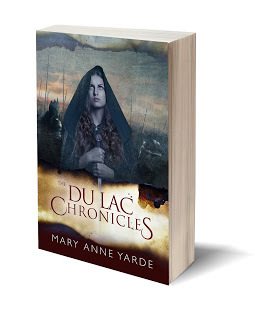
Amazon US
Amazon UK
The Pitchfork Rebellion(Novella)
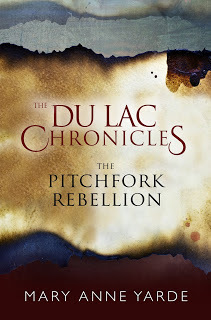
Amazon US
Amazon UK
About the author
 Born in Bath, England, Mary Anne Yarde grew up in the southwest of England, surrounded and influenced by centuries of history and mythology. Glastonbury--the fabled Isle of Avalon--was a mere fifteen-minute drive from her home, and tales of King Arthur and his knights were part of her childhood.
Born in Bath, England, Mary Anne Yarde grew up in the southwest of England, surrounded and influenced by centuries of history and mythology. Glastonbury--the fabled Isle of Avalon--was a mere fifteen-minute drive from her home, and tales of King Arthur and his knights were part of her childhood.At nineteen, Yarde married her childhood sweetheart and began a bachelor of arts in history at Cardiff University, only to have her studies interrupted by the arrival of her first child. She would later return to higher education, studying equine science at Warwickshire College. Horses and history remain two of her major passions.
Yarde keeps busy raising four children and helping run a successful family business. She has many skills but has never mastered cooking--so if you ever drop by, she (and her family) would appreciate some tasty treats or a meal out!
Published on November 07, 2016 00:00
November 3, 2016
Bucket List - run away to Gretna Green and get married - Tick!!
Kingdom of ScotlandCounty of Dumfries – Parish of GretnaThese are to certify to all whom they may concern…
“The hammering of the anvil soon became a notorious sound; romantically it is said that like the metals he forged, the Blacksmith would join couples together in the heat of the moment but bind them for eternity.”
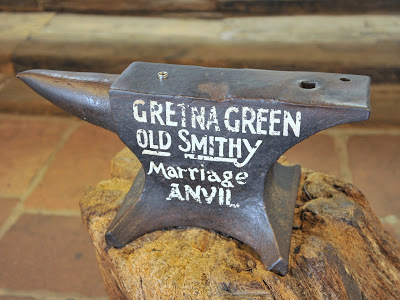
I always thought there was something wildly romantic about running away to Gretna Green to get married. I am sure if you are a reader of Historical Romance than at some point the protagonists would have run away together, to that famous little Blacksmith Shop, hotly pursued, of course, by relations who wanted to stop the wedding from taking place.
The tradition of eloping to Gretna goes back to the 18th Century. English Law Lords tightened the laws on marriage ~ you had to be 21 years of age or over before you could marry without your parent's consent and you had to get married in a church. But…English Law did not apply in Scotland. Scotland was the Vegas of its time ~ you could marry on the spot, either by a simple declaration or, by the act of handfasting. You didn’t have to wait until you were 21, but could marry at 16, and as long as there were two witnesses, then everything was legal. And that was that.
I was one of those lucky people, who met the love of my life very early on. In fact, I was still a teenager. Too young, many said, for us to know each other's minds, let alone marry. What did they know?!
We ignored everyone's opinion and married at a crazy young age anyway.
As the years rolled by we often talked about renewing our vows, privately, where it wouldn’t be about other people's opinions because that really isn't what marriage is about. It is about love between two people and if it isn’t, then, what is the point?
Not so long ago, I was talking to my daughter about our marriage, and I said, if I could do it again I would run away to Gretna Green. My husband was listening in, and when all our children had gone to bed, he said, “Why don’t we run away to Gretna and renew our vows?”
I thought he was jesting to start with, but he was deadly serious, and he asked me to marry him, again!
I said, “I’ll think about it. I'll let you know in the morning.” Actually, no I didn’t say that, I said, “I am game if you are.” I guess a yes would have probably sufficed! But he seemed content enough with my answer.
So that was the real reason we went to Scotland. Not to visit all these amazing places ~ they were just a bonus ~ but to pledge our love to each other. No one knew, except for our children. Most still don’t. So if anyone is reading this, who think they should have been told, then I am sorry about that!
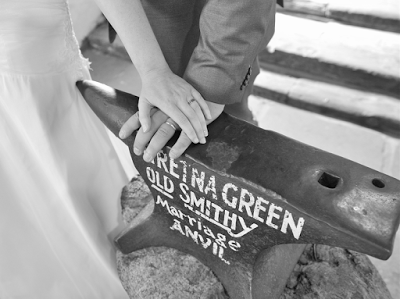
We chose to marry at The Blacksmith Shop, which was incredibly easy to arrange. In fact, I just let these people organise it all!
Gretna Green Since 1754
Wedecided to have a traditional Scottish Wedding, complete with Scottish Piper. I can honestly say I have never laughed so much in my life. The whole experience was surreal. It was the most incredible, wonderfully ridiculous thing that I have ever done. It was absolutely perfect.
 I so loved my flowers!
I so loved my flowers!The, um, coach load of tourists that had just arrived added an extra touch as we came out of the Blacksmiths Shop ~ married, again ~ they clapped and got their phones out. No doubt, somewhere, there are photo’s plastered all over Facebook of us!
And to top it all, we went back to the Smiths Hotel and had Champagne and Fish and Chips. What a wedding reception, it was so much fun. That is the way to do it! I am so glad we did.
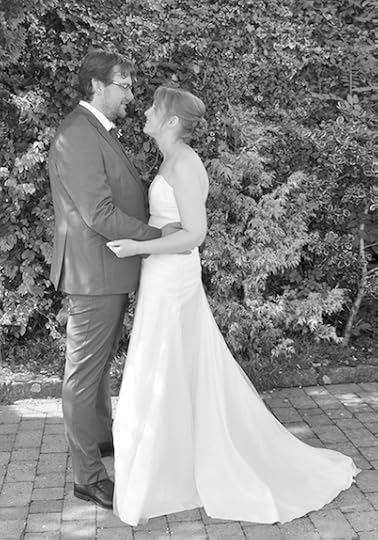
So yeah, that one has got ticked off the Bucket List. I ran away to Gretna Green, with the man I love, and got married!
*All Photos taken by Bill Black PhotographyIf you are getting married at Gretna, and want a photographer, then Bill is your man!*
Published on November 03, 2016 00:00
November 2, 2016
Author’s Inspiration ~ Sarah Kennedy #histfic @kennedynovels
Please give a warm welcome to historical fiction author, Sarah Kennedy. Sarah is going to tell us about her inspiration behind her book… The Altarpiece
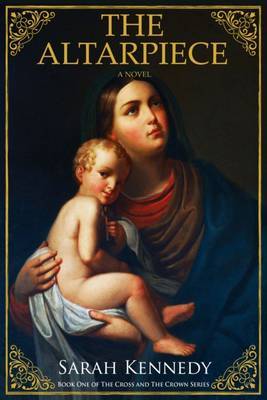 It is 1535, and in the tumultuous years of King Henry VIII’s break from Rome, the religious houses of England are being seized by force. Twenty-year-old Catherine Havens is a foundling and the adopted daughter of the prioress of the Priory of Mount Grace in a small Yorkshire village. Catherine, like her adoptive mother, has a gift for healing, and she is widely sought and admired for her knowledge. Catherine’s hopes for a place at court have been dashed by the king’s divorce, and she has reluctantly taken the veil. When the priory’s costly altarpiece goes missing, Catherine and her friend Ann Smith find themselves under increased suspicion. King Henry VIII’s soldiers have not had their fill of destruction, and when they return to Mount Grace to destroy the priory, Catherin must choose between the sacred calling of her past and the man who may represent her country’s future.*** Author’s Inspiration
It is 1535, and in the tumultuous years of King Henry VIII’s break from Rome, the religious houses of England are being seized by force. Twenty-year-old Catherine Havens is a foundling and the adopted daughter of the prioress of the Priory of Mount Grace in a small Yorkshire village. Catherine, like her adoptive mother, has a gift for healing, and she is widely sought and admired for her knowledge. Catherine’s hopes for a place at court have been dashed by the king’s divorce, and she has reluctantly taken the veil. When the priory’s costly altarpiece goes missing, Catherine and her friend Ann Smith find themselves under increased suspicion. King Henry VIII’s soldiers have not had their fill of destruction, and when they return to Mount Grace to destroy the priory, Catherin must choose between the sacred calling of her past and the man who may represent her country’s future.*** Author’s Inspiration
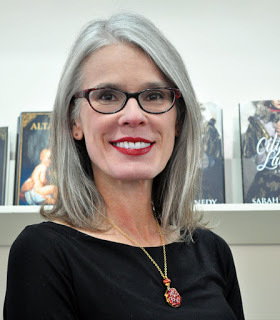 When I began writing The Altarpiece, my first novel, I didn’t really know what I was doing. I was a writer already, but my work was all in poetry, not fiction. I’d studied poems, read poems, taught poems. I had noticed, however, that in working on my fifth book (I’ve published seven poetry collections), that the poems were becoming more narrative—and longer. Instead of my early lyric, autobiographical work, the poems began to find their centers in historical figures, sometimes actual people from research and sometimes imagined characters. When reading old manuscripts and letters, I heard the breath of the writers’ voices in my head, a true in-spiration in the etymological sense of the word, and the words emerged as dialogue. My poems were becoming miniature stories. What was happening?
When I began writing The Altarpiece, my first novel, I didn’t really know what I was doing. I was a writer already, but my work was all in poetry, not fiction. I’d studied poems, read poems, taught poems. I had noticed, however, that in working on my fifth book (I’ve published seven poetry collections), that the poems were becoming more narrative—and longer. Instead of my early lyric, autobiographical work, the poems began to find their centers in historical figures, sometimes actual people from research and sometimes imagined characters. When reading old manuscripts and letters, I heard the breath of the writers’ voices in my head, a true in-spiration in the etymological sense of the word, and the words emerged as dialogue. My poems were becoming miniature stories. What was happening?
I’ve never figured out the entire process by which I became a fiction writer (perhaps I simply got sick of myself!), but I do know that my interests evolved away from the short lyric and toward the sustained development of character. It took a comment from a friend of mine, a member of my poetry-writing group, to make me see that novels were the way forward, to give me my immediate inspiration—though it took a while. She said, upon reading a manuscript of poems, “You know, you really should write a historical novel.” I laughed that off at the time—I couldn’t possibly write a novel!—but her words must have caught at something in my imagination. It kept blowing through my mind, for sure.
As it happened, my teaching was also taking me into investigations of women’s lives. My literary field is the Renaissance, but the Medieval period and the Long Eighteenth Century (beginning roughly with the Restoration of the English monarchy in 1660) had also long been interests of mine. I travel quite a lot to the UK and try to get into the archives of personal documents and manuscripts (letters, diaries, recipe collections) to read first-hand what women said about themselves and their day-to-day tasks. Happily, we also have two autobiographies from the Middle Ages by women, Julian of Norwich and Margery Kempe, which I have always loved reading and teaching. I didn’t know this was going to happen, but one day my teaching and writing interests suddenly converged.
I’ve always loved reading novels: historical novels, crime novels, contemporary character studies, even science fiction. My husband and I were in a bookstore one afternoon, and I was browsing the new historical fiction. That comment from my friend suddenly pulled harder. I picked up a book and said, “I’m going to write one of these.” I went home that night, opened the laptop, and started The Altarpiece.
One scene, that now comes early in the book, was my beginning: a young novice standing in the porch of her church, peering down the road at the soldiers approaching. She knows that Henry VIII has separated the English church from Rome. She knows that they’re coming to close her convent and throw her out. She has no idea what’s going to happen to her. The convent has been her home for her entire life. She has no money of her own. The skills she has won’t be useable (for a woman) outside in the secular world. She’s terrified and angry. Her name is Catherine Havens.
Catherine is a fiction. I created her out of documents I’ve read about the fates of nuns who were evicted from their convent homes under Henry VIII and Thomas Cromwell. We actually don’t know all that much—though the research into these women’s lives is increasing. Many of them fled to the Continent. Some of them, who had wealthy families, returned to their birth homes. Others? Well, we just don’t know. I wanted to give these women who’ve disappeared into the gap of absent history names, stories, and lives.
“Convent fiction” is not a new genre. Writers and readers seem to have an abiding interest in the secret lives of nuns. Sometimes, fictional nuns are quite holy and virtuous; other times, they are quite bad, especially if they’ve been forced into nunneries against their wills. I wanted characters who are both, more like real people. My nuns are people (or at least I hope they are). Some of them are privileged and spoiled. Some of them are devout. Some are content to be in the convent. Others resent it. Most of them are not one-dimensional, even in terms of their faith. They pray, but they fail to act as they should. They love God, but they also love the world.
The Altarpiece was difficult to write, and I had to revise it many times. But I had found in the writing a new genre, one that gave me the space and freedom to create and follow multiple characters, to watch them change and grow. It gave me creative elbow room.
Will I go back to writing poems? Maybe. I still value the compression of poetic expression, the telescoping of idea into resonant language, that generates even more ideas. I still love the heart-stab of a lyric that points directly to a life-altering moment of human experience, and I may feel the pull in the other direction some day. I may want that kind of time-stopping event again. For now, however, writing for me is a narrative journey, filled with both joy and peril and never quite over, even when the book is done.
Links for PurchaseAmazonB&NWaterstones
About the author Sarah Kennedy is the author of the novels The Altarpiece, City of Ladies, and The King’s Sisters, Books One, Two, and Three of The Cross and the Crown series, and Self-Portrait, with Ghost, a stand-alone contemporary novel. She has also published seven books of poems. A professor of English in Virginia, Sarah Kennedy holds a PhD in Renaissance Literature and an MFA in Creative Writing. She has received grants from both the National Endowment for the Arts and the Virginia Commission for the Arts. Please visit Sarah at her website: http://sarahkennedybooks.com
 It is 1535, and in the tumultuous years of King Henry VIII’s break from Rome, the religious houses of England are being seized by force. Twenty-year-old Catherine Havens is a foundling and the adopted daughter of the prioress of the Priory of Mount Grace in a small Yorkshire village. Catherine, like her adoptive mother, has a gift for healing, and she is widely sought and admired for her knowledge. Catherine’s hopes for a place at court have been dashed by the king’s divorce, and she has reluctantly taken the veil. When the priory’s costly altarpiece goes missing, Catherine and her friend Ann Smith find themselves under increased suspicion. King Henry VIII’s soldiers have not had their fill of destruction, and when they return to Mount Grace to destroy the priory, Catherin must choose between the sacred calling of her past and the man who may represent her country’s future.*** Author’s Inspiration
It is 1535, and in the tumultuous years of King Henry VIII’s break from Rome, the religious houses of England are being seized by force. Twenty-year-old Catherine Havens is a foundling and the adopted daughter of the prioress of the Priory of Mount Grace in a small Yorkshire village. Catherine, like her adoptive mother, has a gift for healing, and she is widely sought and admired for her knowledge. Catherine’s hopes for a place at court have been dashed by the king’s divorce, and she has reluctantly taken the veil. When the priory’s costly altarpiece goes missing, Catherine and her friend Ann Smith find themselves under increased suspicion. King Henry VIII’s soldiers have not had their fill of destruction, and when they return to Mount Grace to destroy the priory, Catherin must choose between the sacred calling of her past and the man who may represent her country’s future.*** Author’s Inspiration When I began writing The Altarpiece, my first novel, I didn’t really know what I was doing. I was a writer already, but my work was all in poetry, not fiction. I’d studied poems, read poems, taught poems. I had noticed, however, that in working on my fifth book (I’ve published seven poetry collections), that the poems were becoming more narrative—and longer. Instead of my early lyric, autobiographical work, the poems began to find their centers in historical figures, sometimes actual people from research and sometimes imagined characters. When reading old manuscripts and letters, I heard the breath of the writers’ voices in my head, a true in-spiration in the etymological sense of the word, and the words emerged as dialogue. My poems were becoming miniature stories. What was happening?
When I began writing The Altarpiece, my first novel, I didn’t really know what I was doing. I was a writer already, but my work was all in poetry, not fiction. I’d studied poems, read poems, taught poems. I had noticed, however, that in working on my fifth book (I’ve published seven poetry collections), that the poems were becoming more narrative—and longer. Instead of my early lyric, autobiographical work, the poems began to find their centers in historical figures, sometimes actual people from research and sometimes imagined characters. When reading old manuscripts and letters, I heard the breath of the writers’ voices in my head, a true in-spiration in the etymological sense of the word, and the words emerged as dialogue. My poems were becoming miniature stories. What was happening?I’ve never figured out the entire process by which I became a fiction writer (perhaps I simply got sick of myself!), but I do know that my interests evolved away from the short lyric and toward the sustained development of character. It took a comment from a friend of mine, a member of my poetry-writing group, to make me see that novels were the way forward, to give me my immediate inspiration—though it took a while. She said, upon reading a manuscript of poems, “You know, you really should write a historical novel.” I laughed that off at the time—I couldn’t possibly write a novel!—but her words must have caught at something in my imagination. It kept blowing through my mind, for sure.
As it happened, my teaching was also taking me into investigations of women’s lives. My literary field is the Renaissance, but the Medieval period and the Long Eighteenth Century (beginning roughly with the Restoration of the English monarchy in 1660) had also long been interests of mine. I travel quite a lot to the UK and try to get into the archives of personal documents and manuscripts (letters, diaries, recipe collections) to read first-hand what women said about themselves and their day-to-day tasks. Happily, we also have two autobiographies from the Middle Ages by women, Julian of Norwich and Margery Kempe, which I have always loved reading and teaching. I didn’t know this was going to happen, but one day my teaching and writing interests suddenly converged.
I’ve always loved reading novels: historical novels, crime novels, contemporary character studies, even science fiction. My husband and I were in a bookstore one afternoon, and I was browsing the new historical fiction. That comment from my friend suddenly pulled harder. I picked up a book and said, “I’m going to write one of these.” I went home that night, opened the laptop, and started The Altarpiece.
One scene, that now comes early in the book, was my beginning: a young novice standing in the porch of her church, peering down the road at the soldiers approaching. She knows that Henry VIII has separated the English church from Rome. She knows that they’re coming to close her convent and throw her out. She has no idea what’s going to happen to her. The convent has been her home for her entire life. She has no money of her own. The skills she has won’t be useable (for a woman) outside in the secular world. She’s terrified and angry. Her name is Catherine Havens.
Catherine is a fiction. I created her out of documents I’ve read about the fates of nuns who were evicted from their convent homes under Henry VIII and Thomas Cromwell. We actually don’t know all that much—though the research into these women’s lives is increasing. Many of them fled to the Continent. Some of them, who had wealthy families, returned to their birth homes. Others? Well, we just don’t know. I wanted to give these women who’ve disappeared into the gap of absent history names, stories, and lives.
“Convent fiction” is not a new genre. Writers and readers seem to have an abiding interest in the secret lives of nuns. Sometimes, fictional nuns are quite holy and virtuous; other times, they are quite bad, especially if they’ve been forced into nunneries against their wills. I wanted characters who are both, more like real people. My nuns are people (or at least I hope they are). Some of them are privileged and spoiled. Some of them are devout. Some are content to be in the convent. Others resent it. Most of them are not one-dimensional, even in terms of their faith. They pray, but they fail to act as they should. They love God, but they also love the world.
The Altarpiece was difficult to write, and I had to revise it many times. But I had found in the writing a new genre, one that gave me the space and freedom to create and follow multiple characters, to watch them change and grow. It gave me creative elbow room.
Will I go back to writing poems? Maybe. I still value the compression of poetic expression, the telescoping of idea into resonant language, that generates even more ideas. I still love the heart-stab of a lyric that points directly to a life-altering moment of human experience, and I may feel the pull in the other direction some day. I may want that kind of time-stopping event again. For now, however, writing for me is a narrative journey, filled with both joy and peril and never quite over, even when the book is done.
Links for PurchaseAmazonB&NWaterstones
About the author Sarah Kennedy is the author of the novels The Altarpiece, City of Ladies, and The King’s Sisters, Books One, Two, and Three of The Cross and the Crown series, and Self-Portrait, with Ghost, a stand-alone contemporary novel. She has also published seven books of poems. A professor of English in Virginia, Sarah Kennedy holds a PhD in Renaissance Literature and an MFA in Creative Writing. She has received grants from both the National Endowment for the Arts and the Virginia Commission for the Arts. Please visit Sarah at her website: http://sarahkennedybooks.com
Published on November 02, 2016 00:00
November 1, 2016
Not another #Outlander location? #mustsee #Scotland
Up until the beginning of this year, I had never heard of Outlander ~ I know, how did that happen?
 (Image taken from of Wikipedia)
(Image taken from of Wikipedia)The truth is, I can think of a million things I would rather be doing than watching TV and secondly, if you saw how long my reviewing list for books is, then you would understand why I haven't had the chance to check out any of Diana Gabaldon's books...yet ~ one day, perhaps?!
However, after a long period of abstaining from watching the television, one evening I found myself scrolling through Amazon PrimeVideo and Outlander caught my eye. I had never heard of it, my friends had certainly never mentioned it, but it sounded interesting, so I pressed play. Suddenly I felt like an addict. I couldn't wait to get the kids to bed in the evening so I could indulge in another episode of Outlander and the best bit was, Season 1 had come and gone and Season 2 was half-way through. Non-stop Outlander for about a month - perfect!
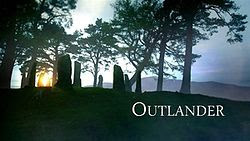
(Image taken from Wikipedia)
*I am sure you will be pleased to know that I am back on the straight and narrow again, the television is once again turned off ~ until the next time!*
While we were traveling in Scotland, I thought it would be rude not to go and visit some of the locations in which Outlander was filmed.
I want to take a moment to thank the location crew/ scouts, whatever they are called, for finding these most amazing places, because if they had not, I would not have seen them on television, and I certainly would not have visited them, and that would have been a crying shame.
My daughter would also like to thank them too, if it wasn’t for Outlander then she would not have had to say “Not another Outlander location? Mum…!” not that she complained too much, she likes exploring old castles as much as I do, and she takes the credit for all the photographs in this blog post (unless stated otherwise).
So today, I thought I would share some of the photographs my daughter took of some of the Outlander locations that we visited.
Doune Castle - Stirling

I was in heaven. I had Sam Heughan chatting away in my ear (the audio guide), explaining how Doune Castle was turned into Castle Leoch. What more could a girl want?!
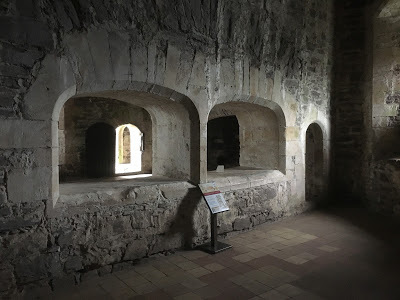 Mrs. Fitz's Kitchen
Mrs. Fitz's Kitchen
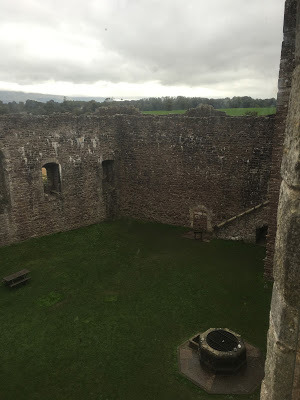
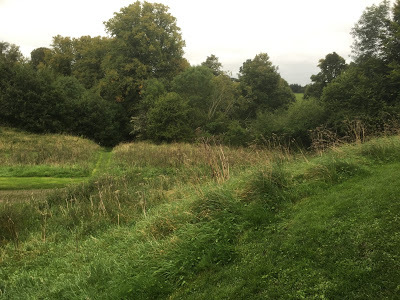

If you have limited time in Scotland and want to go to just one Outlander location, then go here. Castle Doune, not only has the most incredible history, but there is something special about this place ~ although that might have been down to Jamie Fraser ~ I mean Sam Heughan ~ giving me my very own personal guided tour...hey, a girl can dream can't she?
Hopetoun House – Edinburgh
 Hopetoun House was used as a location for the Duke of Sandringham's house, and boy, was it impressive. The tour guide brought the history of the house to life, and it is beautiful. Well worth a visit, and the views from the roof are amazing, or so I am told, I had my eyes closed for most of it ~ if you are a regular reader then you will know I am terrified of heights!
Hopetoun House was used as a location for the Duke of Sandringham's house, and boy, was it impressive. The tour guide brought the history of the house to life, and it is beautiful. Well worth a visit, and the views from the roof are amazing, or so I am told, I had my eyes closed for most of it ~ if you are a regular reader then you will know I am terrified of heights!

Blackness Castle – Edinburgh

Blackness Castle was used on location as Fort William Prison, and I can see why. Blackness Castle is incredibly atmospheric. It was a little bit damp when we went, which did make it a little bit slippery underfoot, but definitely worth a look.
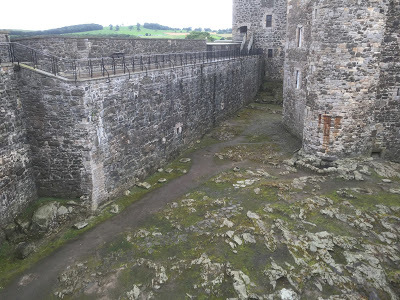


Troon Beach – Ayrshire
Can you remember that scene where Jamie and Clare are forced to flee Scotland and say goodbye to their friends on the beach? Troon Beach was where this scene was filmed. This was a disappointing one for me because as soon as we pulled into the car park the heavens opened. Needless to say, we didn't stay there long, because it was really cold and wet ~ but at least I can say I have been! Unfortunately I don't have any photographs to share with you. Sorry about that!
Preston Mill –Edinburgh
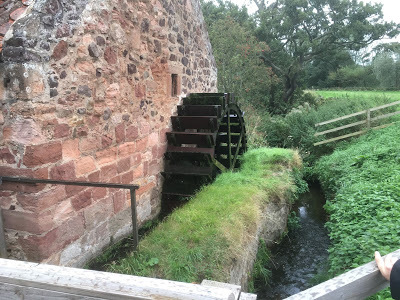
Jamie found his way home to Lallybroch, and he had to make repairs to the watermill.
I have been to that mill!! YAY!
You have to take the guided tour when you look around the mill, as it is an actual working mill, which I think is incredible. I learnt so much about watermills, and the tour guide was fabulous. Thumbs Up for this one!
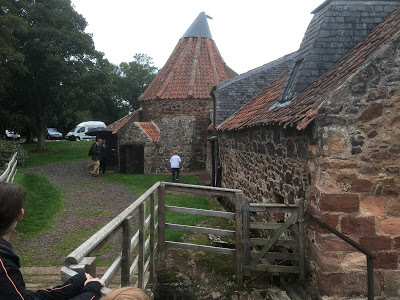
So there we are. We didn't see all the locations, but you know what ~ Scotland isn't going anywhere.
Published on November 01, 2016 00:00
October 31, 2016
#bookreview ~The Scattered Flock #histfict @AuthoJana
The Scattered Flock (The Flock Trilogy Book 2)byJana Petken
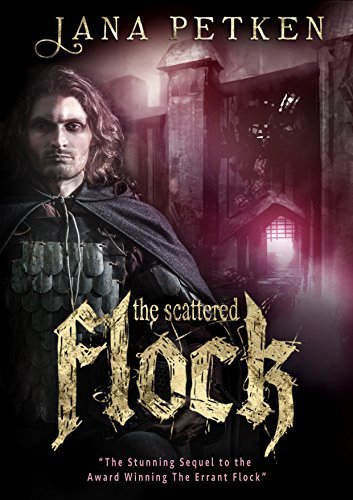
Jana Petken presents The Scattered Flock, a suspenseful, compelling sequel to the multi award winning, The Errant Flock
David Sanz’s journey south is halted abruptly after a devastating turn of events. In a tense battle for survival against thieves and the militia he has been fleeing from, he finds himself shackled and incarcerated in the prison he once guarded.
The Duke of Sagrat’s brother, Rafael Perato, has survived the war, and the royal court’s treacherous intrigues, but when news of his brother’s death reaches their Most Catholic Majesties his life is thrown into turmoil. Banished by the king, and tasked with carrying out insurmountable missions, he becomes entangled in a web of deadly plots and subterfuge, which threaten not only Sagrat but his very life.
In this fast paced epic, David Sanz and Rafael Perato face adversaries more devious and powerful than themselves, and it is only faith, courage, and unlikely alliances, that may save them both from the Inquisitor and the deadly marauder, Alejandro.
***
What did I think of the book?
David Sanz's life has been turned upside down and now fate, once more, has turned her hand against him. After a frantic flee South in a bid to save his own life, he finds himself in chains and facing an uncertain future. But maybe, here, at last, is his chance to have his revenge.
I was looking forward to reading the sequel of The Errant Flock, and this book certainly did not disappoint. With a captivating and emotive story, The Scattered Flock is a book that is very hard to put down.
Petkin's brings 15th Century Spain back to life and in particular the corruption and the cruelty of The Spanish Inquisition.
With unforgettable characters and spellbinding writing, this is a book that gets under your skin and makes you wonder how anyone survived the horror of the Inquisition.
There are several antagonists in this story, but none is as vile as de Amo, he really is a contemptible creature, and he certainly made my skin crawl, which only goes to show how well crafted Petkin's characters are.
As with the last book, I feared for David’s life, and I wondered how much more Petkin’s was gong to throw at the poor man! But he is strong, and his character certainly developed further through the course of this book ~ he is an unlikely hero, but one all the same.
I really liked the character of Rafael Perato. He painstakingly puts all the pieces together as he tries desperately to discover who murdered his brother. Rafael is not afraid to get to the truth, but the more he discovers, the more he realises how deeply corruption is embedded into the ruling class and that of the Church. One wrong move on his part and he would find himself facing his own mortality.
I Highly Recommend this book and I look forward to reading more books by this author.
Links for purchaseAmazon USAmazon UK
About the author
 Jana Petken served in the (British) Royal Navy as a leading Wren Regulator, equivalent to a sergeant in the military police.
Jana Petken served in the (British) Royal Navy as a leading Wren Regulator, equivalent to a sergeant in the military police. After the Navy she worked for a travel company as an overseas representative.
She was a security guard at the BBC World Service radio station. Afterwards she spent twelve years as a bodyguard for a Saudi Arabian Princess.
Her final career was as a cabin-crew member for British Airways. Unfortunately, she suffered serious injuries on board a flight. The aircraft, a Boeing 747, was flying at 39,000 feet above Africa when it was caught in clear-air turbulence. As a result of that accident, she endured three major operations on her spinal cord, and was forced into retirement.
Jana Petken is a multi award winning and best selling historical fiction author. Her books include:
The Guardian of Secrets. (2013)
The Mercy Carver Series: Dark Shadows, book 1, and Blood Moon, book 2. (2014)
The Errant Flock: The Flock Trilogy Book 1. (2015)
Swearing Allegiance. (2016)
Published on October 31, 2016 00:00
The Coffee Pot Book Club
The Coffee Pot Book Club (formally Myths, Legends, Books, and Coffee Pots) was founded in 2015. Our goal was to create a platform that would help Historical Fiction, Historical Romance and Historical
The Coffee Pot Book Club (formally Myths, Legends, Books, and Coffee Pots) was founded in 2015. Our goal was to create a platform that would help Historical Fiction, Historical Romance and Historical Fantasy authors promote their books and find that sometimes elusive audience. The Coffee Pot Book Club soon became the place for readers to meet new authors (both traditionally published and independently) and discover their fabulous books.
...more
...more
- Mary Anne Yarde's profile
- 159 followers



